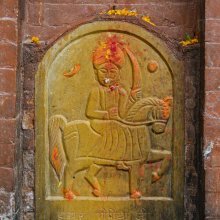Ji, Jī: 14 definitions
Introduction:
Ji means something in Hinduism, Sanskrit, Marathi, Hindi, biology, Tamil. If you want to know the exact meaning, history, etymology or English translation of this term then check out the descriptions on this page. Add your comment or reference to a book if you want to contribute to this summary article.
Alternative spellings of this word include Jee.
Images (photo gallery)
In Hinduism
Vyakarana (Sanskrit grammar)
Source: Wikisource: A dictionary of Sanskrit grammarJi (जि).—A conventional term for संप्रसारण (saṃprasāraṇa) used in the Jainendra Vyakarana.

Vyakarana (व्याकरण, vyākaraṇa) refers to Sanskrit grammar and represents one of the six additional sciences (vedanga) to be studied along with the Vedas. Vyakarana concerns itself with the rules of Sanskrit grammar and linguistic analysis in order to establish the correct context of words and sentences.
Biology (plants and animals)
Source: Google Books: CRC World Dictionary (Regional names)Ji in Nigeria is the name of a plant defined with Sorghum bicolor in various botanical sources. This page contains potential references in Ayurveda, modern medicine, and other folk traditions or local practices It has the synonym Holcus saccharatus L. (among others).
Example references for further research on medicinal uses or toxicity (see latin names for full list):
· Elenchus Plantarum Horti Regni Botanici Matritensis (1803)
· Molecular Ecology (2143)
· Descripción de las Plantas (1802)
· Am. Journal of Botany (1757)
· Taxon (2001)
· Mantissa Plantarum (1771)
If you are looking for specific details regarding Ji, for example pregnancy safety, health benefits, chemical composition, diet and recipes, side effects, extract dosage, have a look at these references.

This sections includes definitions from the five kingdoms of living things: Animals, Plants, Fungi, Protists and Monera. It will include both the official binomial nomenclature (scientific names usually in Latin) as well as regional spellings and variants.
Languages of India and abroad
Marathi-English dictionary
Source: DDSA: The Molesworth Marathi and English Dictionaryjī (जी).—ind A particle of respect in compellation, corresponding to Sir! 2 A familiar particle in calling. Ex. arē khaṇḍūjī. 3 A particle expressing assent: from an inferior. Ex. arē hēṃ kāma karasīla? jī mahārāja. 4 It is an affix of honor to proper names (excepting to names of Brahmans). Ex. bāḷājī, āpājī, raghunāthajī; and to names also of Brahmans when the word panta or the father's name is to be applied afterwards. jījī karaṇēṃ or jī mhaṇaṇēṃ To fawn upon; to court servilely and abjectly.
--- OR ---
jī (जी).—pron Who or which. (Relating to a feminine antecedent).
Source: DDSA: The Aryabhusan school dictionary, Marathi-Englishjī (जी).—ind A particle of respect in compel- lation, corresponding to Sir! A parti- cle expressing assent from an infe- rior. It is an affix to proper names. Ex. bāḷājī, āppājī pro Who or which. (Relating to a feminine antecedent.) jī jī karaṇēṃ, jī mhaṇaṇēṃ Fawn upon; court servilely and abjectly.
Marathi is an Indo-European language having over 70 million native speakers people in (predominantly) Maharashtra India. Marathi, like many other Indo-Aryan languages, evolved from early forms of Prakrit, which itself is a subset of Sanskrit, one of the most ancient languages of the world.
Sanskrit dictionary
Source: DDSA: The practical Sanskrit-English dictionaryJi (जि).—1 P. (Ātm. when preceded, by parā and vi) (jayati, jigāya, jigye, ajaiṣīt-ajeṣṭa, jetum, jita)
1) To conquer, defeat, overcome, vanquish, subjugate; जयति तुलामधिरूढो भास्वानपि जलदपटलानि (jayati tulāmadhirūḍho bhāsvānapi jaladapaṭalāni) Pañcatantra (Bombay) 1.33; Bhaṭṭikāvya 15.76, 19.2.
2) To surpass, excel; गर्जितानन्तरां वृष्टिं सौभाग्येन जिगाय सा (garjitānantarāṃ vṛṣṭiṃ saubhāgyena jigāya sā) Kumārasambhava 2.53; R.3.34; Ghaṭ.22; Śiśupālavadha 1.19.
3) To win (by conquest; in gambling or in a law-suit), acquire by conquest, प्रागजीयत घृणा ततो मही (prāgajīyata ghṛṇā tato mahī) R.11.65; (where ji means 'to conquer' also); Manusmṛti 7.96.
4) To curb, restrain, control, conquer (as passions).
5) To be victorious, be supreme or pre-eminent (generally used in benedictory stanzas or salutations); जयतु जयतु महाराजः (jayatu jayatu mahārājaḥ) (in dramas); स जयति परिणद्धः शक्तिभिः शक्तिनाथः (sa jayati pariṇaddhaḥ śaktibhiḥ śaktināthaḥ) Mālatīmādhava (Bombay) 5.1; जितमुडुपतिना नमः सुरेभ्यः (jitamuḍupatinā namaḥ surebhyaḥ) Ratnāvalī 1.5; Bhartṛhari 2.24; Gītagovinda 1.1.
6) To convict.
7) To overcome or get the better of (as a disease &c.).
8) To expect from (with abl.). -Caus. (jāpayati) To cause to win or conquer. -Desid. (jigīṣati) To wish to win, acquire or excel, to vie with, emulate, to seek for; चलति नयान्न जिगीषतां हि चेतः (calati nayānna jigīṣatāṃ hi cetaḥ) Kirātārjunīya 1.29. With अधि (adhi) to conquer, defeat, vanquish; Bhaṭṭikāvya 19.2.
--- OR ---
Ji (जि).—A demon (piśāca).
Derivable forms: jiḥ (जिः).
--- OR ---
Ji (जि).—1 P. (jemati) To eat.
Derivable forms: jim (जिम्).
Source: Cologne Digital Sanskrit Dictionaries: Shabda-Sagara Sanskrit-English DictionaryJi (जि).—r. 1st cl. (jayati) 1. To excel, to be pre-eminent, to surpass. 2. To conquer, to reduce or overcome. With vi or parā prefixed, (vijayate parājayate) To overcome, to conquer. bhvā-para-saka-aniṭ .
--- OR ---
Ji (जि).—mfn. (jiḥ-jiḥ-ji) Victorious, conquering, a victor. m.
(-jiḥ) A demon. E. ji to conquer, ki aff. jayaśīle piśāce ca .
Source: Cologne Digital Sanskrit Dictionaries: Benfey Sanskrit-English DictionaryJi (जि).— (akin to jyā, q. cf.), i. 1, [Parasmaipada.] (in epic poetry also [Ātmanepada.], Mahābhārata 3, 15193). red. pf. jigāya; ptcple. jigīvān, etc. 1. To overpower, to conquer, [Pañcatantra] i. [distich] 375; [Mānavadharmaśāstra] 4, 181. 2. To be victorious, [Śākuntala, (ed. Böhtlingk.)] 23, 11. 3. To win, Mahābhārata 3, 2229. 4. To win something from somebody (with two accs.), [Daśakumāracarita] in
— With the prep. anu anu, To subdue, Mahābhārata 12, 3124. Desid. To desire to subdue, Mahābhārata 5, 1274.
— With abhi abhi, abhijita, m. The leading star of the twenty-second Nakṣatra, or lunar asterism. Desid. 1. To desire to gain, Mahābhārata 12, 8465. 2. To assail, [Suśruta] 1, 122, 3.
— With ava ava, 1. To extort, Mahābhārata 1, 7765. avajitya, Forcibly, [Mānavadharmaśāstra] 11, 80. 2. To conquer, Mahābhārata 4, 1118.
— With nis nis, 1. To overcome in play, Mahābhārata 3, 2589. 2. To conquer, Mahābhārata 1, 7658. 3. To gain, nirjita, run up, [Mānavadharmaśāstra] 8, 154.
— With abhinis abhi -nis, To overpower, Mahābhārata 14, 2220.
— With parinis pari-nis, To conquer, Mahābhārata 4, 2251.
— With pratinis prati -nis, To rescind, [Rāmāyaṇa] 2, 26, 22.
— With vinis vi-nis, 1. To overpower, [Mānavadharmaśāstra] 11, 205. 2. To conquer, Mahābhārata 3, 1883.
— With parā parā, [Ātmanepada.] (in epic poetry also [Parasmaipada.], Mahābhārata 2, 2141), 1. To succumb, to be defeated, Mahābhārata 4, 1604 (anomal. potent. jayyāt). 2. To lose, Mahābhārata 2, 2141. 3. To overpower, [Rāmāyaṇa] 3, 36, 13; to defeat in a law suit, [Yājñavalkya, (ed. Stenzler.)] 2, 75; parājita, Condemned (by law), [Mānavadharmaśāstra] 8, 58; to defeat in play, Mahābhārata 2, 2171. A-parā-jita, m. A poisonous insect, [Suśruta] 2, 289, 14. f. tā, The northeastern quarter, [Mānavadharmaśāstra] 6, 31.
— With pari pari, To overpower, Mahābhārata 5, 712.
— With pra pra, To overpower, Mahābhārata 7, 70.
— With prati prati, To defeat (in game), Mahābhārata 7, 1357. Desid. To desire to conquer, Mahābhārata 7, 4376.
— With vi vi, [Ātmanepada.] (also [Parasmaipada.], e. g. [Mānavadharmaśāstra] 2, 232), 1. To be victorious, [Pañcatantra] 184, 1. 2. To conquer, Mahābhārata 2, 992. 3. To defeat (in play), [Nala] 26, 22. 4. To overcome; in vijitāsana, i. e. vijita -āsana, adj. Indifferent concerning one’s seat, [Bhāgavata-Purāṇa, (ed. Burnouf.)] 3, 28, 8. [Causal.] To conquer (anomal. Aor. ajījayat), Mahābhārata 7, 2280. Desid. To desire to conquer, [Harivaṃśa, (ed. Calc.)] 8828.
— Cf. [Gothic.] ga-geigan (Frequent.).
Source: Cologne Digital Sanskrit Dictionaries: Cappeller Sanskrit-English DictionaryJi (जि).—jayati jayate [participle] jita conquer, win, subdue, overcome, suppress, expel from ([ablative]), deprive of (2 [accusative]); [absolutely] vanquish (in a game or a suit of law), be victorious. jayati, tu ([with] [nominative]), jitam ([with] [instrumental]) = victorious is or be—, hail to—! [Causative] jāpayati cause to conquer or win (2 [accusative]); salute with reverence*. [Desiderative] jigīṣati wish to win, seek for prey.
Source: Cologne Digital Sanskrit Dictionaries: Monier-Williams Sanskrit-English Dictionary1) Ji (जि):—1. ji [class] 1. jayati, te ([imperfect tense] ajayat; [Aorist] ajaiṣīt, [Vedic or Veda] ajais, 1. [plural] ajaiṣma, jeṣma, 2. sg. jes and [Ātmanepada] jeṣi [subjunctive] jeṣat, ṣas, ṣāma, [Ṛg-veda]; [Aorist] [Ātmanepada] ajeṣṭa; [future] 1st. jetā, [Ṛg-veda] etc.; [future] [2nd.] jeṣyati, [x, 34, 6 etc.]; [perfect tense] jigāya [Pāṇini 7-3, 57], jigetha, jigyur; p. jigīvas [givas, [Taittirīya-saṃhitā i, 7, 8, 4]; [accusative] [plural] gyuṣas] [Ṛg-veda] etc.; [Infinitive mood] jiṣe, [i, 111, 4 and 112, 12]; jetave, [Taittirīya-brāhmaṇa ii]; [Classical] jetum:—[Passive voice] jīyate, ajīyata [Raghuvaṃśa xi, 65], ajāyi, jāyiṣyate; for jīyate and [class] 9. jināti See √jyā)
—to win or acquire (by conquest or in gambling), conquer (in battle), vanquish (in a game or lawsuit), defeat, excel, surpass, [Ṛg-veda] etc. (with punar, ‘to reconquer’ [Taittirīya-saṃhitā vi, 3, 1, 1]);
—to conquer (the passions), overcome or remove (any desire or difficulties or diseases), [Manu-smṛti; Mahābhārata] etc.;
—to expel from ([ablative]), [Śatapatha-brāhmaṇa iii, 6, 1, 17];
—to win anything ([accusative]) from ([accusative]), vanquish anyone ([accusative]) in a game ([accusative]), [Śatapatha-brāhmaṇa iii, 6, 1, 28; xiv, 6, 8, 1 and 12; Mahābhārata iii; Daśakumāra-carita; Pāṇini 1-4, 51; Siddhānta-kaumudī];
—to be victorious, gain the upper hand, [Ṛg-veda; Atharva-veda; Śatapatha-brāhmaṇa iii; Muṇḍaka-upaniṣad; Manu-smṛti vii, 201; Mahābhārata];—often pr. in the sense of an [imperative] ‘long live!’ ‘glory to’ [Śakuntalā; Varāha-mihira’s Bṛhat-saṃhitā; Laghujātaka, by Varāha-mihira; Bhartṛhari] etc.:—[Causal] jāpayati ([Pāṇini 6-1, 48 and 7-3, 36]) to cause to win, [Vājasaneyi-saṃhitā ix, 11 f.];—([Aorist] 2. [plural] ajījipata and ajījap), [Taittirīya-saṃhitā i, 7, 8, 4 and; Śatapatha-brāhmaṇa v, 1, 5, 11 f.; Āśvalāyana-śrauta-sūtra ix, 9];
—to conquer, [Mahābhārata vii, 66, 6] ([Aorist] ajījayat) :—[Passive voice] jāpyate, to be made to conquer, [Horace H. Wilson] :—[Desiderative] jigīṣati, te ([Pāṇini 7-3, 57]; p. ṣat, ṣamāṇa)
—to wish to win or obtain or conquer or excel, [Atharva-veda xi, 5, 18; Taittirīya-saṃhitā ii; Śatapatha-brāhmaṇa; Śāṅkhāyana-śrauta-sūtra; Mahābhārata] etc.;
— ([Ātmanepada]) to seek for prey, [Ṛg-veda x, 4, 3] :—[Intensive] jejīyate, [Pāṇini 7-3, 57; Kāśikā-vṛtti]
2) 2. ji mfn. conquering, [cf. Lexicographers, esp. such as amarasiṃha, halāyudha, hemacandra, etc.]
3) m. a Piśāca, [cf. Lexicographers, esp. such as amarasiṃha, halāyudha, hemacandra, etc.]
4) Jī (जी):—m. ‘sir, mister, Mr.’ (attached to names as a mark of respect), [Horace H. Wilson]
Source: Cologne Digital Sanskrit Dictionaries: Yates Sanskrit-English Dictionary1) Ji (जि):—jayati 1. a. To excel, to conquer. With vi or parā to overcome.
2) [(jiḥ-jiḥ-ji) a.] Victorious.
[Sanskrit to German]
Sanskrit, also spelled संस्कृतम् (saṃskṛtam), is an ancient language of India commonly seen as the grandmother of the Indo-European language family (even English!). Closely allied with Prakrit and Pali, Sanskrit is more exhaustive in both grammar and terms and has the most extensive collection of literature in the world, greatly surpassing its sister-languages Greek and Latin.
Hindi dictionary
Source: DDSA: A practical Hindi-English dictionaryJī (जी) [Also spelled jee]:—(nm) mind; heart; (ind) an honorofic suffix; yes !, yes, sir !; —[ā jānā], ([kisī para]) the heart to be set on (somebody or something); to fall in love with, to be fascinated by; —[ukatānā] to be fed up (of), to be weary (of), to get disgusted (with); —[ucaṭanā] to be ennuied, to get disinterested; not to be able to concentrate (on); —[uḍā jānā] to feel nervously restless; —[ūbanā/ūba jānā] to be fed up, to be browned off; —[kaḍā karanā] to muster courage, to prepare oneself for any eventuality; —[karanā] to set heart on, to long (for); —[kāṃpanā] to feel scared; —[kā bojha halakā honā] to be relieved of a worry or apprehension; to feel soothed; —[kī amāna māṃganā] to seek or requested pardon; to preface a discourse with excuses; —[kī jī meṃ rahanā] (a wish or longing) not to have a chance for expression or materialisation; —[ko māranā] to repress a longing; to practise self-denial; —[khaṭṭā honā] to be disenchanted/disgusted; to set (person’s) teeth on the edge; —[kholakara] freely, without any restraint or stint; to one’s heart’s content; —[ghabarānā] to feel nervous, to be uneasy; —[cāhanā] to desire, to long (for); —[cāhe] if you feel like, if you so desire; —[curānā] to shirk (work); to cast a spell (upon), to charm, to captivate; —[choṭā karanā] to lose heart, to be discouraged; —[jalanā] to be grieved, to have a sore heart; —[jalānā] to get in one’s hair, to wound/grieve, to plague; —[jāna se] heart and soul, passionately; whole-heartedly; —[jāna se kośiśa karanā] to knuckle down to it; —[jāna se juṭa jānā] to blaze away; —[jāna se kurbāna] devoted heart and soul; —[jāna se phidā honā] to be passionately in love with, to be infatuated by; —[ṭūṭa jānā] to be frustrated/disheartened; —[ḍubanā] to sink, to faint; —[tarasanā] to long or yearn (for); —[toḍa kośiśa karanā] to try heart and soul, to knuckle down to it; —[dahalanā] to be scared out of wits; —[dukhānā] to grieve, to cause grief (to); —[dhaka-dhaka karanā] see —[dhaḍakanā; —dhaḍakanā] the heart to palpitate, to have a palpitation, to shudder; —[pānī honā] the heart to be moved by compassion; —[pighala jānā] to be deeply moved by pity; —[phaṭanā] see [dila phaṭanā; —phiranā] to be disgusted with, to feel repelled from; —[bahalānā] to recreate, to divert the mind, to amuse so as to dissipate reflection; —[baiṭhanā] see [dila baiṭhanā; —bhara ānā] (lit.) the heart to be full, to be touched with compassion or be deeply moved; —[bhara kara] to one’s heart’s content, to the top of one’s bent; —[bharanā] to be satiated, to be fed up; —[matalānā/micalānā] to feel nausea, to feel like vomitting; —[meṃ ānā] to occur in one’s mind; to have a fancy (for); —[meṃ ghara karanā, —meṃ basanā] to find a place in the heart (of), to create a profound sense of endearment (in); —[meṃ jalanā] to be consumed with jealousy or envy, to eat one’s heart out; —[meṃ baiṭhanā] to be impressed or fixed in the mind; —[rakhanā] to appease; to please; —[laganā] to feel quite oneself; •[laganā] ([kisī kāma ādi meṃ]) to be able to concentrate on, to be absorbed in; 0([kisī jagaha ādi para]) to feel easy, to feel quite at home; —[lagānā] to set one’s heart (on); to concentrate (on); to fall in love (with); —[lalacānā] to hanker after, to feel allured; —[lubhānā] to allure or entice, to captivate the heart of; —[loṭa-poṭa honā] to pant for; to be passionately charmed (by); —[se utara jānā] to lose the favour or regard of, to fall in the esteem of; —[se jānā] to lose one’s life; —[hāranā] to lose spirits, to be disheartened/discouraged; ~[hujūra] a yes-man, sycophant; ~[hujarī karanā] to chime in, to play a sycophant.
...
Kannada-English dictionary
Source: Alar: Kannada-English corpusJī (ಜೀ):—
1) [noun] an owner of a slave; an employer of workers or servants; a master; a boss.
2) [noun] a term used to convey the sense of agreement, consent, affirmation to one’s master, elder, etc.; (equivalent to English words 'yeś 'okay', etc.).
3) [noun] a speech lauding, praising another.
Kannada is a Dravidian language (as opposed to the Indo-European language family) mainly spoken in the southwestern region of India.
See also (Relevant definitions)
Starts with (+2257): Jeet, Jeevanapaddati, Jeevanasangram, Jeevandhan, Jeevanmaran, Ji bei, Ji cai, Ji dan hua, Ji dan hua shu, Ji gu cao, Ji gu chai, Ji gu chang shan, Ji gu xiang, Ji guan hua, Ji ji, Ji ji shu, Ji jiao shen, Ji li, Ji li huang qi, Ji long mao gen.
Ends with (+1571): Aane gulaganji, Aane jaaji, Aane-gulaganji, Aanegulaganji, Aattalanji, Abaleba-ji, Abbhanji, Abbuji, Abhigajji, Abhiji, Abhikuji, Abhinipajji, Abhinipphajji, Abhiraji, Abhisajji, Abhiyunji, Abhuji, Abhyugji, Acaloji, Adaragamci.
Full-text (+829): Jim, Vanaraji, Aji, Raji, Vijin, Jemana, Shitabhojin, Dhvajarajin, Parannabhojin, Ucchishtabhojin, Rajavijin, Sarvannabhojin, Padaji, Ajaji, Dhvajin, Yaji, Bhuji, Jima, Vraji, Jema.
Relevant text
One of your search terms exceeds the minimun character amount per search term. This amount currently equals 2.
No search results for Ji, Jī in any book or story.
Related products



